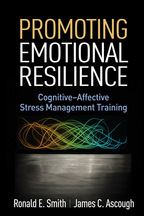Promoting Emotional Resilience
Cognitive-Affective Stress Management Training
Ronald E. Smith and James C. Ascough
“This volume represents an important departure from narrow manuals for treating DSM-diagnosed disorders and deals with what the therapist actually needs to do in clinical practice. Grounded both in empirical evidence and good clinical judgment, it provides invaluable guidelines for therapists.”
—Marvin R. Goldfried, PhD, Distinguished Professor of Psychology, Stony Brook University
“Promoting Emotional Resilience presents a powerful, detailed, evidence-based brief intervention program designed to help clients both experience and cope with life stress and negative emotions. The session-by-session chapters are beautifully written, with excellent patient handouts and clinical dialogues used to demonstrate key treatment principles. Smith and Ascough are among the founders of emotional processing treatments, and their approach reflects their unparalleled breadth and depth of knowledge. This book is a perfect fit for clinicians who wish to obtain superior clinical outcomes in as few sessions as possible. Highly recommended!”
—Kirk D. Strosahl, PhD, cofounder of acceptance and commitment therapy
“This outstanding book by Smith and Ascough provides a set of vivid, step-by-step guidelines for delivering a brief, empirically supported stress management and emotion regulation program that is widely useful not only for psychotherapists, but also for others coaching individuals with high stress or dysfunctional fear. The book is a really valuable clinical and training resource with easy-to-follow instructions and examples. Particularly notable is the induced affect technique, a powerful skills rehearsal procedure that is unknown to many clinicians, but applicable in many forms of therapy to address emotional avoidance and dysregulation. I was so excited about the strategies that I have incorporated them into my DBT skills book, and I am sure this book will be an important training resource in our DBT workshops and in the training of our graduate students. Likewise, the theoretically derived Stress and Coping Diary is an invaluable collaborative assessment and outcome tracking tool. This book is amazing and you won’t want to pass it by.”
—Marsha M. Linehan, PhD, ABPP, Professor and Director Emeritus, Behavioral Research and Therapy Clinics, University of Washington; developer of DBT
Table of Contents
Introduction and Overview1. Emotion, Stress, and Coping: Implications for Intervention
2. An Overview of Cognitive–Affective Stress Management Training
3. Affect Elicitation in Psychotherapy: The Induced Affect Technique
4. Preparation, Assessment, and Session 1
5. Session 2: Cognitive Coping Skills—Introduction to Cognitive Restructuring and Self Instructional Training
6. Session 3: Induced Affect Reduction Using Relaxation and the Integrated Coping Response
7. Session 4: Induced Affect Skills Rehearsal and Introduction to Meditation and Mindfulness
8. Session 5: Integrated Coping Response Practice, Acceptance, and Cognitive Defusion Training
9. Session 6: Coping Skills Rehearsal and Additional Cognitive-Behavioral Strategies
Appendix A: Handouts and Forms for Clients
Appendix B: Materials for Therapists/Trainers
References
About the Authors
Ronald E. Smith, PhD, is Professor of Psychology and Director of Clinical Training at the University of Washington, where he also has served as head of the Social Psychology and Personality Program. His major professional interests are psychological stress and coping, therapeutic assessment, and performance enhancement research and intervention. A past president of the Association for Applied Sport Psychology, Dr. Smith’s publications include numerous books and more than 200 articles and book chapters, over 60 of which are in the areas of anxiety, stress, and coping.James C. Ascough, PhD, is in part-time private practice at Mascouten Associates in West Lafayette, Indiana. He served on the faculties of the University of Georgia and Purdue University, and was Director of Child and Adolescent Services at Wabash Valley Hospital in West Lafayette, Indiana. Dr. Ascough's research focused on autonomic nervous system arousal, measures of affect, and models of cognitive imagery and behavior change. He is a recipient of the Sagamore of the Wabash Award, Indiana’s highest state honor, for his contributions to youth mental health.
